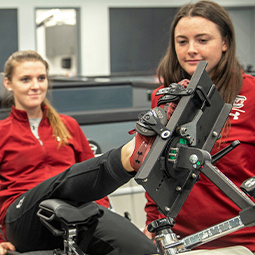
Find Out More
The Masters of Science (MS) degree program provides students with foundational content in exercise physiology, research methods and statistics and offers flexibility to select coursework in specific areas of interest.
January 2, 2025 | Erin Bluvas, bluvase@sc.edu
Exercise oncology emerged as a scientific field of study in the past decade or two, but the efficacy of using this type of therapy for cancer survivors has been around for more than a century. M.S. in Exercise Science student Scott Anderson wields it as a powerful tool for enhancing health and one’s overall outlook on life.
“I see exercise as a key to unlocking our physical and mental potential, as well as fostering and maintaining meaningful relationships – both socially and within our homes,” he says.
Using exercise science to fight cancer has become Anderson’s career, but it was personal for him first. The North Augusta native was in the final stages of a vocational shift from chemical operator to kinesiology when his wife of 16 years was diagnosed with stage 2 breast cancer.
Anderson had already begun working as a personal trainer and cross fitness instructor and was finishing up his bachelor’s degree at Augusta University when Kristin’s cancer was discovered. It was also during this time that exercise science assistant professor Ciaran Fairman trekked Southwest from the Arnold School to give a presentation on his area of expertise: exercise oncology.
“That introduction changed the course of my academic and professional journey,” says Anderson, who enrolled in the master’s program and became the program coordinator for Fairman’s Exercise Oncology Lab a few months later. “Dr. Fairman has been integral to my success and growth over the past two years. He has taken the time not only to guide me in my experience here at USC but also to help hone my thought process and provide insight into the field of research, as well as how to balance life and work and find joy in the process.”
During his program – and Kristin’s treatment – Anderson learned the ins and outs of running a scientific lab, including oversight of 20 undergraduate research assistants, recruiting participants for studies, and collecting/analyzing data. He quickly developed a passion for research, particularly exercise oncology.
After graduating in May, the couple and their two kids (Hunter, 13, and Brooke, 10) will move to Colorado, where Anderson plans to continue working as a research coordinator while also pursuing a doctoral degree in the field.
“I have fallen in love with research and want to continue honing my skills in this area,” he says. “The journey has been challenging – one I wouldn’t have chosen under those circumstances – but it’s a path I wouldn’t trade for anything. Life is often difficult, but at the end of the day, it’s what we make of the challenges that truly defines us.”